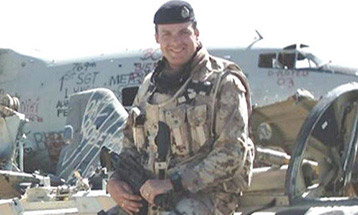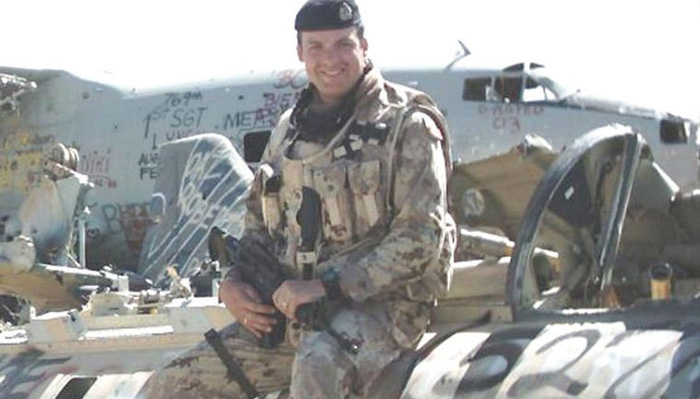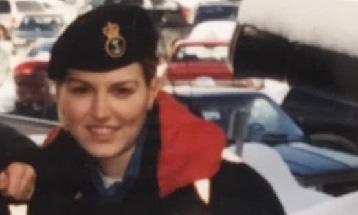Owen Parkhouse knew that he would miss the community and camaraderie of military life when he retired in 2017, after 20 years of service in the Royal Canadian Navy. He soon learned that he was also missing the direction and purpose of military service.
Owen has stayed close to his comrades, serving as President of his local Legion branch in Prince Edward Island. He is also the 1st Vice President of the Legion’s PEI Command, and Dominion Vice-President of the national executive.
As if that’s not enough, Owen is also the President of the New Brunswick–Prince Edward Island Last Post Fund. With all this going on, he had difficulty finding balance and structure. Through an online seminar called Shaping Purpose, he learned to work towards important life goals outside of an organizational structure.
The military life
Born in Montreal, Owen’s family moved to Ottawa when he was still young. Owen’s military service began at age 15, when he joined the Canadian Militia in Ottawa. Later, he joined the Canadian Armed Forces and became a naval officer.
Owen’s career took him around the world. He served in East Timor and in Afghanistan, working with the U.S. Army.
In 2008, Owen became the first Peer Support Coordinator in PEI with the Operational Stress Injury Social Support (OSISS) service, a job he held for five years. Then, he became the Deputy Chair of the Veterans Appeal and Review Board. “It was good work, making sure our Veterans got the disability benefits they deserved.”
Like many who serve in the armed forces, Owen dealt with tragic situations. He recalls recovering victims of drowning from the Adriatic Sea, and after the crash of Swissair Flight 111 off Peggy’s Cove in 1998. He was on the scene of a suicide car bomb attack in Afghanistan, and was working in the Pentagon on 11 September 2001.
Life after service
Post-traumatic stress led to Owen’s medical release from CAF in 2017, at age 53. He settled with his family in the village of Morell, near Charlottetown, PEI.

Lt. Cmdr. (Ret.) Owen Parkhouse, President of Royal Canadian Legion, Charlottetown, PEI
He kept busy, volunteering “big time,” (in his words) with the Royal Canadian Legion. “It was important to me to keep in contact with the people I served with,” Owen explains. “They’re like family.”
Retirement also brought a number of challenges. “I kind of fell out of setting goals,” Owen explains. “When I retired, I tended to lose that.”
His wife Elizabeth researched programs that could help Owen deal with his PTSD and the transition to life after service, and found the Shaping Purpose program, which received funding from the Veteran and Family Well-Being Fund in 2018.
Shaping Purpose is a four-day, facilitated online course, developed for Veterans and their families who experience difficulties transitioning to life after service. The goal is to help Veterans develop a plan that best fits their individual values, passions and gifts. Both Owen and his wife, Elizabeth, signed up for the July session.
Three facilitators led the program, one of whom had military experience. “It’s important to have someone who recognizes that being in the military is a very different life,” Owen says.
The course stresses writing down clear personal goals, and concrete plans to achieve them. “I was always someone who thought about the pros and cons of things before deciding, but I never put my plans down on paper.”
The Parkhouses made a plan to pay off their home mortgage faster, a plan that is on track now.
Owen made a plan to accomplish a long-held dream: to publish a children’s book he wrote years ago, when he was still in the Navy.
He also wrote down a plan for a somewhat loftier goal: to become Lieutenant-Governor, or perhaps even Governor General someday. “I realize it’s a political process that I have little control over, but it was nice that the facilitators didn’t discount me when I brought it up.”
Perhaps the most important lesson that Owen Parkhouse has learned is the importance of leveraging other people who can help you or are going through something similar.
That goes hand-in-hand with a lesson he learned long ago: “Helping others helps you.”
Shaping Purpose is funded in part by the Veteran and Family Well-Being Fund, which provides grants and contributions to private, public or academic organizations to conduct research and implement initiatives and projects that support the well-being of Veterans and their families.
Date published: 2021-01-29




